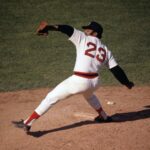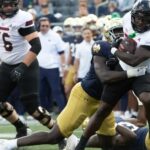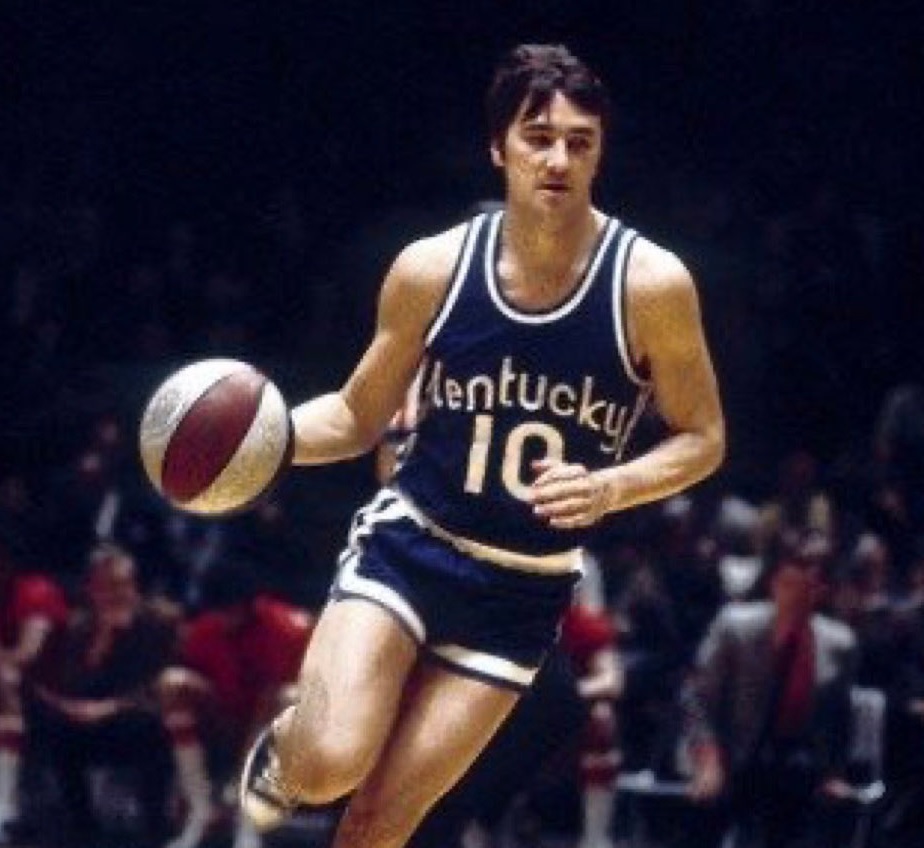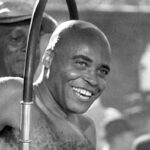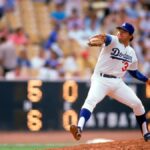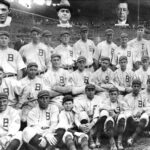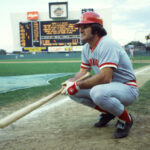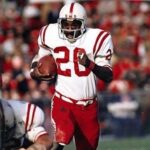2010 U.S. Olympic Men’s Hockey Team: No Miracle Needed
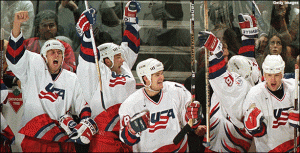
The US men's hockey team will look to earn gold in Vancouver.
The US men’s team has actually had a good record historically in international hockey. The two gold, seven silvers and one bronze medal the US has won at the Olympics puts them third in Olympic men’s hockey medals behind only Canada and the Russian/Soviet/CIS teams. They’re ahead of such perennially successful hockey powers Sweden and Czechoslovakia/Czech Republic. This historical international success hasn’t generally translated in the ability to produce top quality NHL players. It generally speaking, hasn’t correlated with America’s ability as a hockey playing nation.
Despite amateur international success the US was producing very few hockey players in general and much fewer good enough to play in the original six NHL. Despite four franchises in the United States the NHL was dominated by Canadian born players. There were a few great American players at the time. Frank Brimsek the hall of fame Bruin goalie comes to mind.
Major Frederic McLaughlin the first owner of the Chicago Blackhawks was famous for a variety of things he did with his new franchise. One of the more bizarre things though was to ice a starting lineup of all American born players towards the end of the 1936-37 season. It wasn’t really an indication of how good American players had become and in fact had a side-show promotional feel to it.
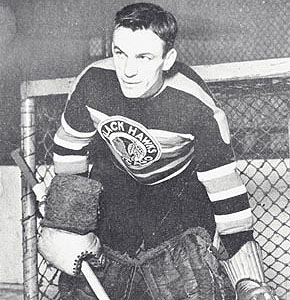
Mike Karakas was the goalie on the team of American born players competing for the Chicago Blackhawks in 1937.
Still Minnesota born Mike Karakas was the goalie on this Chicago team and had won the Calder trophy as the NHL rookie of the year the year before. He was a good NHL goalie and had a ten year NHL career. Louis Trudel, center Elwin “Doc” Rommes and defenseman Alex Levinsky were all American born hockey players who had reasonable if unspectacular NHL careers that played on that Chicago team. Unfortunately McLaughlin also brought in five Americans: Ernest Klingbeil, Milton Brink, Paul Schaeffer, Al Suomi, and Ben LaPrairie whose only five games in the NHL were to be that year with Chicago. The signing of those players had more to do with selling tickets then developing and promoting indigenous hockey players. American hockey at that time was strictly constricted to the northeast United States and quality NHL players from that region were few and far between.
The 1960 Squaw Valley Olympics saw a gold medal winning performance by a collection of American university hockey players. Goalie Jack McCartan was a university of Minnesota alum when he played on the US Olympic ice hockey team in 1960. He gave up seventeen goals in the seven game tournament and nine of those were in two games versus the Czechoslovakians. McCartan on loan from the US army was critical in the game against Canada making thirty eight saves, with twenty coming in the second period.
The US beat Canada’s top senior amateur team, the Kitchener-Waterloo Dutchmen, 2-1.
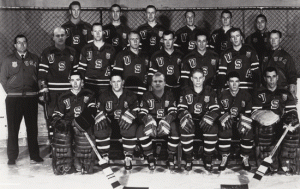
The 1960 US Olympic team was the first American hockey miracle.
The Soviets were on the cusp of becoming the greatest Olympic and world hockey nation on earth. The Soviet hockey team had won gold at the previous Olympics and was destined to win the next four Olympic tournaments in a row. Bill Christian scored the tying and winning goal as the US beat those Russians 3-2. The US finished the round robin tournament 7-0 by beating the Czechoslovakians 9-4 in the last game. Bill Cleary, Bill Christian and John Mayasich lead the team offensively and Jack McCartan shone in goal as the best goaltender at the Olympics that year. Cleary never played professional hockey though he was offered a pro-contract by the Montreal Canadiens after the 1956 Olympics. Jack McCartan had a short NHL career with the New York Rangers and then bounced around several minor pro leagues. He ended his time in hockey playing three seasons for the Minnesota Fighting Saints of the WHA. Bill Christian never played in the NHL. They were great players on a great team but a long way from being the best hockey players in the world.
The 1980 Lake Placid Olympics featured a Soviet Union team which was the most dominant team in the history of international hockey. The Soviets had a line-up that featured veteran Valeri Kharlamov, likely the best Russian player ever. Vladislav Tretiak was the best goalie Russia has ever produced. Certainly if his play in exhibition series against Canadian professionals and NHL club teams was any indication he was arguably the best goalie in the world at the time. A young Sergei Makharov and Vladimir Krutov were unstoppable on offense. Viacheslav Fetisov, the Scott Stevens of Russian hockey, was teamed with Alexei Kasatonov both destined for greatness in the NHL. Veteran Valeri Vasiliev rounded out a rock solid, mobile defense.
Vladamir Petrov, Boris Mikhailov and Alexander Maltsev were all veteran performers who had starred on the 1972 Russian national team that almost beat the Canadian NHL players in an eight game tournament. This was a team of stars playing a system built for success at any level in competitive hockey. They played and practiced year round as a team. A good number of these players were allowed to play in the NHL late in their careers and often excelled. Certainly Fetisov, Makharov and Kasatonov proved themselves in the NHL. The Swedish National team who took the bronze medal that year in contrast featured only three future NHL stars: Pelle Lindbergh who would become a great goalie for the Philadelphia Flyers, Mats Naslund, left winger and eventual captain of the Montreal Canadiens and Tomas Jonsson later a defenseman with the Islanders and Oilers. At the time of course these amateurs were 20 and 21 year old kids. The Russians featured a line-up of grizzled +30 year old veterans and a hoard of men in their physical prime at twenty seven and twenty eight.
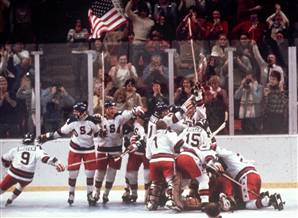
The Lake Placid miracle in 1980 was one of the biggest upsets in sports history.
US Olympic hockey teams had won consecutive silver medals in the two Olympics before Squaw Valley. In 1980 the US had only won one silver medal in the last twenty years. The USSR had become the most dominant force in international hockey. While a gold medal doesn’t seem that far a stretch for a team that’s been second at the two previous Olympics, at Lake Placid the US were prohibitive underdogs to win a medal.
The US team at the time of the Lake Placid Olympics was the seventh seed. They were again a collection of college players coached by Squaw Valley late cut, Herb Brooks. That this unlikely collection of boys managed to beat the men of the Soviet Union’s national hockey team is in a lot of ways incomprehensible. This chastened Soviet team retooled after their Olympic embarrassment. They dumped some aging veterans and put together the famed green unit by adding Igor Larionov to Makharov, Krutov, Kasatonov and Fetisov and won the 1981 Canada Cup. They slaughtered a Canadian professional team featuring Wayne Gretzky, Guy Lafleur, Ray Borque, Mike Bossy, Bob Gainey and Dennis Potvin, 8-1 in the final. This was the team and the system the American college players were being asked to beat.
Herb Brooks based his team on speed and conditioning. He got Miraculous goaltending from Jim Craig. He also managed to capitalize on Soviet tactical errors in the game against the US. Vladamir Tretiak was taken from the game after the first period. The old stars Boris Mikhailov and Valeri Kharlamov could no longer keep up with the younger American skaters.
Still they were kept in at critical points in the third period. The younger and faster Krutov and Makharov were kept on the bench. This young American team had more talent than is often supposed as well. Dave Christian, son of Bill Christian from the 1960 Olympics, was one of the best and fastest American skaters. A career forward he was asked to play defense by Brooks and he gave them excellent speed at the back end. Dave went on to have a distinguished thousand game career in the NHL. Neal Broten and Mark Johnson could play on anybody’s team and again had great NHL careers. Ken Morrow proved to be a valuable cog on defense for those great Islander teams of the 80’s. Mike Ramsey was another key US 1980 Olympian who went on to play more than a thousand games in the NHL. There were more job opportunities in 1980 in the NHL then in 1960 but these US players were better relative to the rest of the world then they had been twenty years before. This US team despite how overmatched they were, represented a quantum improvement in quality and quantity of US born hockey players. This miracle was more driven by talent then people at the time believed.
More and more, better and better, US born hockey players have been produced in the thirty years since the 1980 gold medal. Production of talent in any sport is erratic but generally speaking the percentage of US born players in the league has grown from an insignificant number to almost 20% at a time when international players from every other hockey playing nation on earth have flooded into the NHL. More important than that, the quality of US players has improved in an almost exponential fashion.
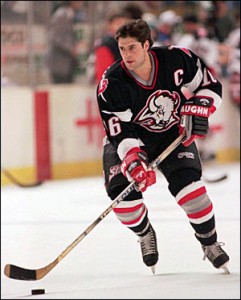
Pat Lafontaine was a member of the 1996 American team that won the World Cup.
This steady development of depth of talent eventually produced what was arguably the best American hockey team in history for the World Cup in 1996. The World Cup/Canada Cup tournaments were the defacto world hockey championships at the time. This was because NHL professional players were still being prohibited from playing at the Olympics and the World Championships only featured NHLers who had missed the playoffs or whose teams got eliminated in the first round. The World Cup US team had Mike Richter in nets. The defense was Brian Leetch, Chris Chelios, Kevin Hatcher, Derian Hatcher, Gary Suter, Phil Housley, and Mathieu Schneider. The offense was led by Pat Lafontaine, Mike Modano, Tony Amonte, Brett Hull, John Leclair, Keith Tkachuk, Doug Weight, Bill Guerin and Adam Deadmarsh.
This team cruised through the preliminary round going unbeaten and beating the favored Canadians 5-3 in Philadelphia and the Russians 5-2 in New York. The US beat the Russians again 5-2 in the semi-finals and then beat the Canadians in the best of three final series. They lost the first game 4-3 in overtime and then won the next two games handily by identical 5-2 scores in Montreal. Brett Hull led the tournament in scoring and Mike Richter was tournament MVP. The US was the legitimate world champion of hockey. They’d beaten everybody soundly at that tournament.
US hockey fell back a bit when basically the same line-up performed poorly at the Nagano Olympics. A team that had been designed to beat Canada on NHL sized rinks had less success with international rules and Olympic sized ice. All the players were two years older and that had mostly been a veteran team that won in 1996.
The Salt Lake Olympics provided another more accurate look at American hockey talent. The other hockey nations have improved as well but the US has a spot deservedly near the top. Unfortunately one high pressure tournament every four years is a tough way to gauge relative hockey skill.
The U20 world hockey championships are held every year at Christmas. All nations participating send their best players available. Generally a small percentage of them are already playing on NHL teams and can’t play at the World Juniors. Everyone else attends. This tournament gives a nice indication of what nations are developing skilled young hockey players year in and year out.
In 1999 the US failed to make the world junior playoffs despite Brian Gionta leading the tournament in scoring. Since then the US has always made the playoffs and never finished worse than fifth. Those eleven years have seen the US win twice, finish third once, fourth five times and fifth three times. The US currently has over 400,000 people playing registered hockey. This is the second highest total on earth. The record at the world junior championships has shown the US is producing quality young hockey players as well. The US has to be considered at least the fourth or fifth best hockey nation on earth right now.
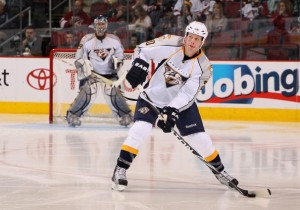
Ryan Suter is among the standouts on the 2010 US Olympic team.
The current USA men’s Olympic hockey team is full of players who have excelled at the world juniors in the last decade. The defense features Ryan Suter, Jack Johnson, Eric Johnson and injury replacement Ryan Whitney all who starred at the U20 worlds. Zach Parise, Bobby Ryan, Patrick Kane and Phil Kessel have also all recently starred at that international tournament against the world’s best U20 players.
The US players who starred on the 2010 gold medal U20 team can be expected on NHL rosters and to play for the US at international tournaments for years to come. US hockey has grown from being little better then a sideshow in Chicago in the 30’s to a world class main event at the turn of the century. The USA is an international hockey power. They are legitimately one of the best hockey playing nations on earth. As more Americans play organized hockey and more are funneled into elite programs the quality of American players produced can only improve. The US may be the fourth or fifth best hockey nation in the world at the Olympics in Vancouver in 2010, but they are a legitimate gold medal contender. I’d say they’re likely to win a medal despite how tightly contested this tournament should be.
By the time 2014 rolls around a lot of these talented 21 and 22 year olds will be approaching their prime. A whole new cohort of young American hockey stars will be available to play. The world better watch out because America may be the favorite for gold at Sochi.
